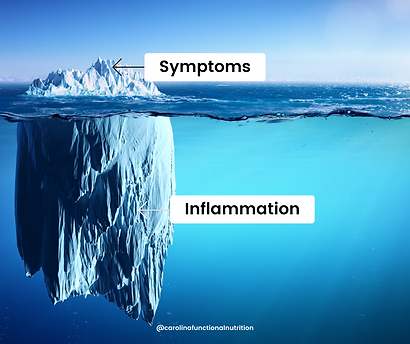Inflammation has been cited as the root of all chronic disease. I like the iceberg analogy where the visible tip of the iceberg represents the symptoms, and the underlying portion is the inflammation driving the symptoms.

Symptoms of inflammation could include:
- Joint pain
- Headaches
- Allergies
- GI issues
- Hormonal imbalances
It all begins in the Gut
And it’s probably no surprise that addressing the root cause of inflammation begins in the gut. The gut is a central hub of communication among all the body systems so as the saying goes—when the gut ain’t happy ain’t nobody happy! That means even if the primary symptom is weight gain or joint pain, a leaky gut, multiple food sensitivities, or bacterial overgrowth can compromise absorption, trigger inflammation, and therefore inhibit healing in other body parts. Sometimes balancing inflammation means more than restoring optimal gut function, but it’s usually a great place to start!
I can see clearly [my real underlying issues] now, my gut has been restored...
Once a leaky gut has been restored, the remaining root cause(s) and contributors of inflammation become more clear, and often easier to fix. Hormonal imbalances and nutrient deficiencies may need to be addressed in order to facilitate full resolution of systemic inflammation. In some cases such as chronic viral infections, ongoing immune support may be warranted.
Stress management is also essential to long-term inflammation regulation and disease prevention. In fact, some would argue that stress may actually be the real root cause of most diseases because unregulated stress drives inflammation.
Remember the iceberg analogy? When we just manage the symptoms, the bulk of the iceberg doesn’t go away. Regardless of what the inflammation looks like, treat the root cause not just the symptoms.
So are you experiencing any of the Symptoms we discussed here? If you're wanting to start into getting to the root cause, take the quiz, here.




Recent Blog Posts
Share this post!
About the Author
Rhya Pachin is a licensed dietitian nutritionist who employs an "integrative" approach to support overall health rather than addressing just one symptom. As a certified LEAP therapist, she designs and supervises custom elimination diets. Her focus areas include gastrointestinal conditions like IBS and IBD, autoimmune diseases such as rheumatoid arthritis and Hashimoto's, persistent weight issues, food sensitivities, and chronic inflammatory conditions in both adults and children.



